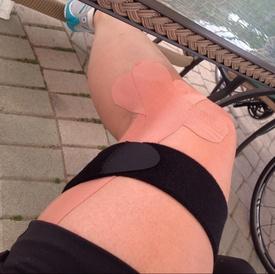sea salt any better for you than reg. salt?

aeverton
Posts: 359 Member
just curious?
Angie
Angie
0
Replies
-
Most products labeled sea salt aren't really any different than regular salt. Look for a salt that hasn't been bleached and processed. Something like Himilayan (sp) salt.
Salts like this will be much more expensive but they have much more minerals and a lot more flavor.0 -
Do we consider "more minerals" = healthy ?0
-
No.
I like sea salt better (& exotic salts, like the pink & black, Hawaiian salts, etc), because of the taste and texture, but it's not like one has less sodium, it's still the chemical makeup of the mineral salt. Some of those colored salts might have more trace minerals, but I wouldn't at all factor that into my decision on what to eat, no.0 -
Only if your specific nutritional needs are for those minerals. But at least in unprocessed salts they are available where as in white salts they generally are not.Do we consider "more minerals" = healthy ?0 -
The biggest difference, from what I've heard, is that if you're using a teaspoon of sea salt in a recipe or whatever, each individual grain of salt is larger than regular table salt, the spaces between them are larger, so you're using less salt overall per teaspoon.0
-
KOSHER salt has less sodium, approx 100mg sodium / 1/4 teaspoon. A chef friend told me, and I looked it up. (Trust no one!)
So replace your home salt with kosher...
I use flaked fleur de sel in my cooking because i pinch and control better, but often I season with herbs VS salt.0 -
Wait, dammit! Kosher or koshering salt (since all salt is generally kosher) seems to be lower sodium for the same reasons as sea salt. Bigger crystals. If anyone knows more, hit us up! NOW I'm CURIOUS!!0
-
Sodium is sodium. Just watch your total intake.
A.C.E. Certified Personal Trainer
IDEA Fitness member
Kickboxing Certified Instructor
Been in fitness for 28+ years and have studied kinesiology and nutrition0 -
It makes you feel superior0
-
Neither is actually that bad. Salt is the last thing you need to worry about. I've never seen any convincing data that showed a significant benefits from reducing salt in your diet, and it has been studied quite a bit. About 1/3 of the population can supposedly get chronically elevated BP from too much salt, but you have to wonder if those people are also the ones who just never exercise.
EDIT: reducing salt intake has not been shown to be an effective method for reducing blood pressure.0 -
Salt is salt. Chemically it's all the same. The only differences are the sizes of the crystals.0
-
Sea salt does not typically have Iodine added to it, which is a necessary nutrient. Also,the focus on salt/sodium related to elevated blood pressure is typically misguided. Elevated blood pressure related to sodium intake is actually due to the intake ratio of sodium and potassium. Most people do not get enough potassium, it's been suggested most are 1000mg deficient per day, but get sufficient or excess sodium. If those people would increase their potassium intake in relation to their sodium intake, in most cases the sodium derived elevated blood pressure would be resolved.0
-
It makes you feel superior
LOL.0 -
I was taught in culinary school that all salt in sea salt0
-
just curious?
Angie
Salt is salt. No matter. You need to watch your sodium intake and all quantities are equal no matter the type.0 -
Sea salt has 98 mineals that are good for us and table salt has 2. Also there is sugar in table salt... I didnt believe it till I read the ingrediant label.0
-
l like mrs dash salt...0
-
They make lite salt, 50% less sodium than regular.
http://www.mortonsalt.com/products/foodsalts/Lite_Salt.htm0 -
I have no idea about health benefits plus or minus, but I only use Maldon Sea Salt. Little flakes so soft you can crumble then between your finger and thumb rather than using a grinder.
I am a salt snob :blushing:0 -
salt is salt, but sea salt usually is coarser than standard table salt, and the texture often means that you end up using less of it. So "no," but "yes." Sort of.
 0
0 -
No.
I like sea salt better (& exotic salts, like the pink & black, Hawaiian salts, etc), because of the taste and texture, but it's not like one has less sodium, it's still the chemical makeup of the mineral salt. Some of those colored salts might have more trace minerals, but I wouldn't at all factor that into my decision on what to eat, no.
Because sea salts are stronger in taste, less is more, so therefore you will end up consuming way less sodium in general. The stronger the sea salt, the less you use and less sodium consumed.
We switched to sea salt back in 2005 and haven't looked back. I have quite the little selection of different salts from around the world and is a way to add different tastes to foods.0 -
Idk? Whenever my thyroid levels were low, my doctor specifically told me to use iodized salt because of the iodine in it...so there's that.0
-
It tastes a lot better. Crunching the flakes in your mouth so they burst on your tongue - fantastic. Just use as rarely as you can - salt is quite an easy habit to get out of0
-
just curious?
Angie
Salt is salt. No matter. You need to watch your sodium intake and all quantities are equal no matter the type.
With sea salts you use WAY less, therefore you are consuming way less salt. It takes about a third of the amount of sea salt to flavor a meal than with regular table salt.0 -
The biggest difference, from what I've heard, is that if you're using a teaspoon of sea salt in a recipe or whatever, each individual grain of salt is larger than regular table salt, the spaces between them are larger, so you're using less salt overall per teaspoon.
The bigger crystals also "melt" more slowly, so the taste is more pronounced when used on meats etc at the table. There is even a measuring difference between brands depending upon the crystal size.0 -
All salt is sea salt. Just how old it might be or other assorted minerals that add flavor/texture. Its really only a taste thing.0
-
Iodine in the amounts we need are found in common foods when they are grown in proper soils and in the case of meat, raised in a healthy way, so that in itself is not a reason to use regular table salt. I'm however also with others on whether or not salt's health pariah status is justified.Sea salt does not typically have Iodine added to it, which is a necessary nutrient. Also,the focus on salt/sodium related to elevated blood pressure is typically misguided. Elevated blood pressure related to sodium intake is actually due to the intake ratio of sodium and potassium. Most people do not get enough potassium, it's been suggested most are 1000mg deficient per day, but get sufficient or excess sodium. If those people would increase their potassium intake in relation to their sodium intake, in most cases the sodium derived elevated blood pressure would be resolved.0
-
Neither is actually that bad. Salt is the last thing you need to worry about. I've never seen any convincing data that showed a significant benefits from reducing salt in your diet, and it has been studied quite a bit. About 1/3 of the population can supposedly get chronically elevated BP from too much salt, but you have to wonder if those people are also the ones who just never exercise.
EDIT: reducing salt intake has not been shown to be an effective method for reducing blood pressure.
There is also a thing called fructose-induced hypertension (and carbs make your body retain sodium and water).
this is an interesting article I just pulled up really quick: http://www.hindawi.com/journals/ijn/2011/392708/ (although I believe the amount of carbs that are pushed on us is what is causing us to overeat and become inactive. They keep us hungry. This is my opinion). Of course I think the entire study was done on mice (as usual).
What I've heard about table salt vs. sea salt is they both contain the same amount of sodium per serving BUT sea salt has a stronger flavor so you end up using less.
I stick with Mediterranean Pink, and Himalayan Sea salts. I'm sorry, but the table salt we know has been industrially processed so much that I don't consider it real salt. And sea salt just tastes better.0 -
Minuet traces of minerals, but not enough to make a difference. (I use it.)0
-
They make lite salt, 50% less sodium than regular.
http://www.mortonsalt.com/products/foodsalts/Lite_Salt.htm
^^^This is what I use. It's half sodium, half potassium.0
This discussion has been closed.
Categories
- All Categories
- 1.4M Health, Wellness and Goals
- 398.2K Introduce Yourself
- 44.7K Getting Started
- 261K Health and Weight Loss
- 176.4K Food and Nutrition
- 47.7K Recipes
- 233K Fitness and Exercise
- 462 Sleep, Mindfulness and Overall Wellness
- 6.5K Goal: Maintaining Weight
- 8.7K Goal: Gaining Weight and Body Building
- 153.5K Motivation and Support
- 8.4K Challenges
- 1.4K Debate Club
- 96.5K Chit-Chat
- 2.6K Fun and Games
- 4.8K MyFitnessPal Information
- 12 News and Announcements
- 21 MyFitnessPal Academy
- 1.6K Feature Suggestions and Ideas
- 3.2K MyFitnessPal Tech Support Questions





















